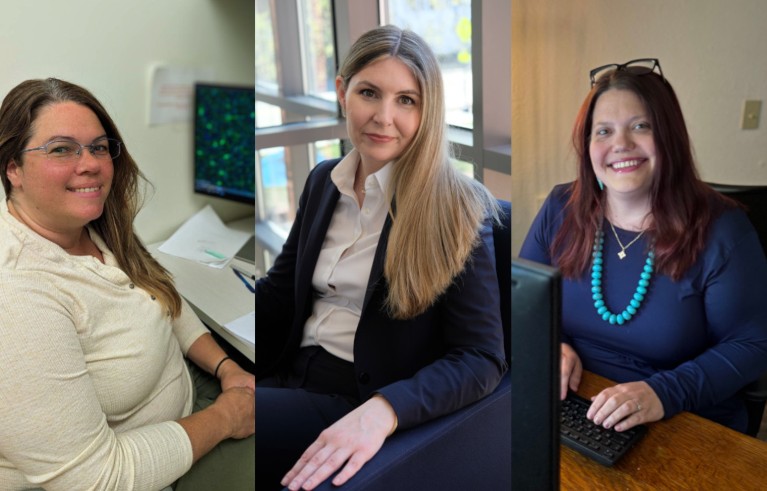
Plaintiffs (L to R) Nicole Maphis, Brittany Charlton and Katie Edwards. Credit: L-R: Nicole Maphis/Andrew Flamang/Emily Seluta
Lawyers representing scientists are pursuing one of several court cases to reinstate US National Institutes of Health (NIH) research grants terminated by the administration of US President Donald Trump on topics that it deems “unscientific” or that “no longer effectuate agency priorities”.
The plaintiffs say the “boilerplate” termination letters did not provide adequate reasoning as to how any specific study failed to meet the agency’s standards for research. The outcome is still uncertain, but a 16 June hearing is set for oral arguments on the legality of the agency’s directives to terminate the grants.
The plaintiffs include four individual researchers and three organizations with scientific members who conduct research on topics including sexual assault against women and people of colour, vaccine hesitancy, health disparities for people from sexual and gender minorities (LGBTQ+) and Alzheimer’s disease. They argue that the cancellations are unlawful for two reasons: they are arbitrary and capricious, and they violate the US Constitution’s separation of powers because they override congressional mandates on the NIH.
Lawyers for the researchers argued in court on 22 May for a preliminary injunction against the cancellations. At a 3 June hearing, William Young, a district judge in Massachusetts, decided to merge the researchers’ suit with another that was filed on 4 April by 16 state attorneys-general against the Department of Health and Human Services, which oversees the NIH, along with its secretary Robert F. Kennedy Jr, the NIH and its director Jay Bhattacharya, for unlawfully terminating existing grants for medical research.
One of the plaintiffs in the new challenge, epidemiologist Brittany Charlton at Harvard T.H. Chan School of Public Health in Boston, Massachusetts, has lost five grants that supported her research on LGBTQ+ health disparities. The grants totaled US$16 million, of which at least $5 million had yet to be spent. “It had been my dream of the last 20 years, from the moment I stepped onto Harvard’s campus, to launch a centre on LGBTQ+ health, which I did last June,” she says. The vast majority of the centre was funded by her grants. “I don’t have funding to do my research anymore.”
Charlton reached out to civil-rights organizations, including the American Civil Liberties Union (ACLU), headquartered in New York City. Working pro bono, Protect Democracy, a non-profit organization in Washington DC that is representing the researchers, joined the ACLU, the ACLU of Massachusetts and the Center for Science in the Public Interest, a non-profit organization in Washington DC, to file the lawsuit on 2 April on the researchers’ behalf. “It was so abundantly clear that people were scared to speak out,” says Charlton. “Many of us [studying LGBTQ+ health] have been targeted our entire careers. We have gotten bomb threats in the past for the work we do. We were ready for this,” she says.
Yet the data are clear that LGBTQ+ health disparities exist on many levels. US Centers for Disease Control and Prevention (CDC) data show that young LGBTQ+ people are disproportionately affected by poor mental health, suicidal behaviour, violence and sexually transmitted infections. LGBTQ+ individuals also face increased rates of discrimination and unfair treatment in health-care settings. Charlton says her yet-to-be-published research suggests that lesbian women are significantly more likely to have a stillbirth than are their heterosexual counterparts. “That research may never see the light of day because the grant is ended. That is not an efficient use of resources,” she says.
Charlton’s first grant termination arrived roughly ten days after she spoke to the press about cuts to transgender-health funding. “I knew that was potentially the risk I was taking,” she says. A few days later, four more of her grants were terminated.
‘This is so costly’
Co-plaintiff Katie Edwards, a researcher at the University of Michigan in Ann Arbor who studies violence against minority populations, including young transgender people, has lost six grants from the NIH and one from the National Science Foundation, totaling roughly $13.9 million — of which about half was lost on termination. “My research is helping us understand some of the most vulnerable people. We’re just trying to help kids be healthy and make good decisions to help themselves and others. I don’t know why that’s controversial,” she says.
Edwards found that a curriculum that teaches participants how to recognize sexual-assault risk and gain self-defence knowledge dramatically improved Native American girls’ ability to thwart violence and harassment1. She has also developed an online programme for LGBTQ+ teenagers that reduced alcohol use and dating violence in this group2. “For an administration that wants to save money, this is so costly. Prevention is cost-effective,” she says. According to the CDC, the economic impact of sexual violence is around $122,000 per victim over their lifetime when accounting for lost work, health care and legal fees.
Edwards has also conducted one of the largest studies so far on the public-health impact of sexual assault on men from sexual minorities, currently involving more than 3,000 participants. “We had to stop data collection and cannot analyse the data,” she says. “The whole point of the study was to inform policy.”
Edwards has submitted roughly 30 grants to foundations and philanthropists in a bid to keep the research going and her 50-person staff employed. Working 15-hour days over the past 6 weeks, she’s amassed $10,000 — far short of the several million that she was awarded. “We’ve already had to reduce a sizable fraction of my staff to part-time status, from full-time positions with benefits, as of 30 May,” she says; the vast majority will soon follow suit without more funding. Edwards is also forgoing her summer salary, which is paid from grants, to keep her team afloat.
“This litigation is the only thing giving me a sense of hope. I feel so powerless,” she says of watching her career, her team and her efforts to serve communities fall apart.


